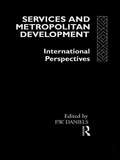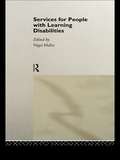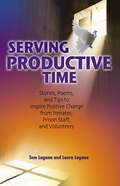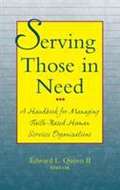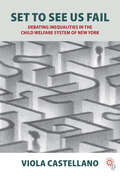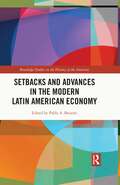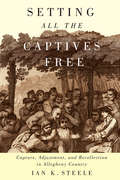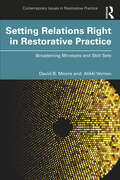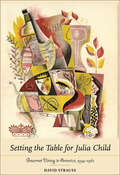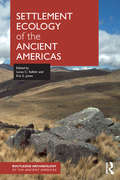- Table View
- List View
Services and Metropolitan Development: International Perspectives
by P. W. DanielsThe dynamics of national and international urban systems, as well as individual metropolitan areas, are closely connected with the decisions and actions of firms and institutions in the service sector. Services and Metropolitan Development explores the processes guiding both the development and the spatial impacts of services on the urban system and individual areas. The book describes the symbiotic relationship between the internationalisation of services and the effects of this re-structuring on urban systems. The multidisciplinary nature of the subject and its global development are reflected by the international range of contributors, specialists in geography, business management, economics and public administration. The book analyses the theoretical, conceptual and measurement issues confronting research on the development of services in North America, Northern Europe and Australia.
Services for Aging Persons in China: Spatial Variations in Supply and Demand (Global Perspectives on Health Geography)
by Xiaoping Shen Shangyi Zhou Xiulan ZhangThis volume draws upon one of the first comprehensive studies on the regional variations of services for aging persons in China to provide an empirical and theoretical understanding of the impact of China's rapidly growing aging population on the country's socioeconomic, cultural, and political systems. In three parts, the manuscript combines case-oriented comparative methods with variable-oriented statistical and GIS analyses to examine the spatial patterns and relationships between supply and demand of affordable and accessible services for aging persons in China. Part one gives a historical review of population aging in China, including the development of services for aging persons and government policies and programs geared towards elders. Part two provides an analysis of spatial variations of supply and demand for services including food, housing, health, and community services for aging persons. Part three uses case studies to analyse the regional and local dimensions of elderly services. Suggestions are made for future planning, development, and policies. This book will appeal to policy makers, city planners, service providing businesses, and advanced undergraduate and graduate students studying economic geography, planning, and regional development.
Services for People with Learning Disabilities
by Nigel MalinServices for People with Learning Disabilities provides a broad review of available services for people with learning disabilities. It describes the present network of services and explains the NHS and Community Care Act (1990) in terminoloy accessible to health care professionals and others engaged in this area. It looks in detail at the concepts underpinning new legislation, including care-management and assessment, quality and inspection, and inter-agency planning, and it supplies up-to-date information on current topics such as advocacy and empowerment, and recreation and leisure. An invaluable resource for all practitioners in health and community care, Services for People with Learning Disabilities will also give professionals and carers a much greater understanding of the changes and improvements that are still needed.
Servicing the Middle Classes: Class, Gender and Waged Domestic Work in Contemporary Britain (Routledge International Studies of Women and Place)
by Michelle Lowe Nicky GregsonServicing the Middle Classes investigates the recent rise in demand by middle class families for waged domestic labour and the consequent growth of a new `servant' class.Examining the position of nannies and cleaners, the authors explore the national socio-economic trends which have led to this new phenomenon and the profound changes this reflects in our concepts of motherhood and class and gender relations.
Serving God in a Migrant Crisis: Ministry to People on the Move (Operation World Resources)
by Dean Merrill Stephan Bauman Patrick Johnstone"God has used migration for millennia to achieve his purposes for his people," writes Patrick Johnstone. "He is doing so again in our time." Millions are on the move, driven by war, drought, terrorism, poverty, failed states, environmental catastrophes, disease, revolutions, and the desire for a better life. Christians have a unique perspective on the migrant crisis: after all, Jesus was a refugee. So were Abraham, Joseph, and Moses. Today, some turn their backs on refugees. In Serving God in a Migrant Crisis, Patrick Johnstone and Dean Merrill help us understand what's causing today's refugee crisis, explore Christian theology and tradition on migration, and show us how Christian workers around the globe are opening their hearts to embrace these modern outcasts. "The world has literally come to our doorstep," they write. "Will we open the door?"
Serving Productive Time: Stories, Poems, and Tips to Inspire Positive Change from Inmates, Prison Staff, and Volunteers
by Tom Lagana Laura LaganaFrom the coauthor of Chicken Soup for the Prisoner's Soul—a program that develops positive change for inmates and their loved ones With their books Chicken Soup for the Prisoner's Soul and Chicken Soup for the Volunteer's Soul, Tom and Laura Lagana have shown readers how to make positive use of their time—whether they are serving others or serving time. In Serving Productive Time they go one step further, using powerful stories, poems, and cartoons created by inmates and others to address the realities of penal existence. They build on these voices of experience with essays and advice that show inmates how to truly make their time count, and give meaning to their lives right now, while making amends for their crimes and working toward release. Inspires inmates to use programs and resources, perform positive deeds, and acquire skills Empowers correctional staff, counselors, families, and volunteers to help inmates who want to make positive changes in their lives
Serving Those in Need: A Handbook for Managing Faith-Based Human Services Organizations
by Edward L. Queen IIGiven the increased pressures and higher demand on social-service organizations, faith-based providers must find ways to increase their effectiveness while maintaining their religious distinctiveness.
Serving in Silence: The Story of Margarethe Cammermeyer
by Chris Fisher Margarethe CammermeyerIn 1989, in a routine interview for top-secret security clearance - a requisite for admission to the Army War College - Colonel Margarethe Cammermeyer was asked about her sexual orientation. After pausing for a moment to take a breath, she said, "I am a lesbian." Thus began an ordeal that continues to this day. Intense media coverage of the former colonel's dismissal from the U.S. Army has stirred debate all the way to the presidency. Her Bronze Star for duty in Vietnam, her being named Nurse of the Year by the Veterans Administration, and her role as Chief Nurse of the Washington State National Guard marked a long and distinguished military career. Her goal to become Chief Nurse of the entire National Guard was abruptly ended in 1992 by her discharge based on sexual orientation. With the same calm, assured articulation that won her one leadership position after another, Cammermeyer writes of her decision to challenge official policy on homosexuality and of her recent victory in Federal District Court. But this is not only a book about what she described in Time as "sticking around to get beaten up." It is also about coming of age, being a mother, and finding one's center; about "coming out," the daily horrors of nursing in Vietnam, and a female soldier's life.
Sesame Street (LIFE)
by The Editors of LIFELIFE Magazine presents Sesame Street for LIFE Sesame Street.
Set Adrift Upon the World: The Sutherland Clearances
by James HunterThis true story of a mass eviction in nineteenth-century Scotland is &“a moving, gripping, definitive account of a struggle for survival (Scots Magazine).A Saltire Society History Book of the Year They would be better dead, they said, than set adrift upon the world. But set adrift they were—thousands of them, their communities destroyed, their homes demolished and burned. Such were the Sutherland Clearances, an extraordinary episode involving the deliberate depopulation of much of a Scottish Highlands county. What was done in the course of it was planned and carried out by a small group of men and one woman, seeking a more profitable use of the land. Most of those involved wrote a great deal about their actions, intentions, and feelings, and much of it has been preserved. There are no equivalent collections of material from those whose communities ceased to exist. Their feelings and fears are harder to access, but by no means irrecoverable. In this book, James Hunter tells the story of the Sutherland Clearances. His research took him to archives in Scotland, England, and Canada, to the now deserted valleys of Sutherland, to the frozen shores of Hudson Bay. The result is a story of a people&’s struggle for survival in the face of tragedy and disaster, covering experiences not featured in any previous such account. &“Detailed and unsparing . . . . [The author] is careful to present the evidence for all he records.&” —London Review of Books
Set Fear on Fire: The Feminist Call That Set the Americas Ablaze
by LasTesisA fiery feminist manifesto from the Chilean performance collective who led the rallying cry for today's mass feminist movement across South AmericaAfter the feminist art collective LASTESIS created their performance &“A Rapist in Your Path&” in their native Chile, it went viral across the globe, becoming the anthem of the grassroots feminist movements in South America and around the world. This is their manifesto, an angry, unrepentant tour-de-force that moves through rage, femicide, abortion, homophobia, feminist art, and the oppression of the state to argue for a feminist world based on collective struggle and a visionary political art.Translated by Camila Valle.
Set the Night on Fire: L.A. in the Sixties
by Mike Davis Jon WienerA magisterial, riveting movement history of Los Angeles in the SixtiesLos Angeles in the sixties was a hotbed of political and social upheaval. The city was a launchpad for Black Power—where Malcolm X and Angela Davis first came to prominence and the Watts uprising shook the nation. The city was home to the Chicano Blowouts and Chicano Moratorium, as well as being the birthplace of &“Asian American&” as a political identity. It was a locus of the antiwar movement, gay liberation movement, and women&’s movement, and, of course, the capital of California counterculture. Mike Davis and Jon Wiener provide the first comprehensive movement history of L.A. in the sixties, drawing on extensive archival research and dozens of interviews with principal figures, as well as the authors&’ storied personal histories as activists. Following on from Davis&’s awardwinning L.A. history, City of Quartz, Set the Night on Fire is a historical tour de force, delivered in scintillating and fiercely beautiful prose.
Set the World on Fire: Black Nationalist Women and the Global Struggle for Freedom (Politics and Culture in Modern America)
by Keisha N. BlainIn 1932, Mittie Maude Lena Gordon spoke to a crowd of black Chicagoans at the old Jack Johnson boxing ring, rallying their support for emigration to West Africa. In 1937, Celia Jane Allen traveled to Jim Crow Mississippi to organize rural black workers around black nationalist causes. In the late 1940s, from her home in Kingston, Jamaica, Amy Jacques Garvey launched an extensive letter-writing campaign to defend the Greater Liberia Bill, which would relocate 13 million black Americans to West Africa.Gordon, Allen, and Jacques Garvey—as well as Maymie De Mena, Ethel Collins, Amy Ashwood, and Ethel Waddell—are part of an overlooked and understudied group of black women who take center stage in Set the World on Fire, the first book to examine how black nationalist women engaged in national and global politics from the early twentieth century to the 1960s. Historians of the era generally portray the period between the Garvey movement of the 1920s and the Black Power movement of the 1960s as one of declining black nationalist activism, but Keisha N. Blain reframes the Great Depression, World War II, and the early Cold War as significant eras of black nationalist—and particularly, black nationalist women's—ferment.In Chicago, Harlem, and the Mississippi Delta, from Britain to Jamaica, these women built alliances with people of color around the globe, agitating for the rights and liberation of black people in the United States and across the African diaspora. As pragmatic activists, they employed multiple protest strategies and tactics, combined numerous religious and political ideologies, and forged unlikely alliances in their struggles for freedom. Drawing on a variety of previously untapped sources, including newspapers, government records, songs, and poetry, Set the World on Fire highlights the flexibility, adaptability, and experimentation of black women leaders who demanded equal recognition and participation in global civil society.
Set to See Us Fail: Debating Inequalities in the Child Welfare System of New York (Anthropology at Work #3)
by Viola CastellanoExamining the interaction between families and professionals in the child welfare system of New York, this book focuses on how inequalities are reproduced, measured, managed, and contested. The book describes how state institutions and neoliberal governance police the groups which are most represented in the child welfare system, including low income, female-headed families living in racialized neighborhoods. The book also shows how these forms of policing produce unstable terrains, and give rise to contestation among families, communities, and professionals. It questions and re-thinks how state welfare and protection is administered.
Set-Theoretic Methods for the Social Sciences
by Carsten Q. Schneider Claudius WagemannQualitative Comparative Analysis (QCA) and other set-theoretic methods distinguish themselves from other approaches to the study of social phenomena by using sets and the search for set relations. In virtually all social science fields, statements about social phenomena can be framed in terms of set relations, and using set-theoretic methods to investigate these statements is therefore highly valuable. This book guides readers through the basic principles of set theory and then on to the applied practices of QCA. It provides a thorough understanding of basic and advanced issues in set-theoretic methods together with tricks of the trade, software handling and exercises. Most arguments are introduced using examples from existing research. The use of QCA is increasing rapidly and the application of set-theory is both fruitful and still widely misunderstood in current empirical comparative social research. This book provides an invaluable guide to these methods for researchers across the social sciences.
Setbacks and Advances in the Modern Latin American Economy
by Pablo A. BaisottiThis volume explores several notable themes related to the economy in Latin America and offers insightful historical perspectives to understand national, regional and global issues in the continent since the beginning of the 20th century to the present day. The collected essays focus on economic crises, the relationship of growth models to society and politics, the fluctuations of local economies and regional protests. Other aspects of consideration in this area include the evolution of integrated regional trading blocs, the informal economy, and the destruction of the productive potential that has had a serious social, cultural and environmental impact. The volume refuses to impose a traditional and uncritical linear historical narrative onto the reader and instead proposes an alternative interpretation of the past and its relation to the present.
Setsuko's Secret: Heart Mountain and the Legacy of the Japanese American Incarceration
by Shirley Ann HiguchiAs children, Shirley Ann Higuchi and her brothers knew Heart Mountain only as the place their parents met, imagining it as a great Stardust Ballroom in rural Wyoming. As they grew older, they would come to recognize the name as a source of great sadness and shame for their older family members, part of the generation of Japanese Americans forced into the hastily built concentration camp in the aftermath of Executive Order 9066. Only after a serious cancer diagnosis did Shirley's mother, Setsuko, share her vision for a museum at the site of the former camp, where she had been donating funds and volunteering in secret for many years. After Setsuko's death, Shirley skeptically accepted an invitation to visit the site, a journey that would forever change her life and introduce her to a part of her mother she never knew. Navigating the complicated terrain of the Japanese American experience, Shirley patched together Setsuko's story and came to understand the forces and generational trauma that shaped her own life. Moving seamlessly between family and communal history, Setsuko's Secret offers a clear window into the "camp life" that was rarely revealed to the children of the incarcerated. This volume powerfully insists that we reckon with the pain in our collective American past.
Setting Agendas in Cultural Markets: Organizations, Creators, Experiences (Routledge Research in Communication Studies)
by Philemon BantimaroudisThis book draws on agenda setting theory to examine how cultural organizations relate to media in order to increase their visibility, valence, and eventually build their public image. Most organizations have a keen interest in their symbolic presence, as their media visibility influences public knowledge, perceptions and even behaviors. Diminished public funding, in combination with the global proliferation of cultural entities, creates a competitive environment, leading to a transformation of cultural industries. In the book, several questions are under scrutiny: How do cultural organizations acquire symbolic significance? How do they become prominent in media content? Which mechanisms and processes should be examined by cultural managers as they set out to achieve salience? Is there a relationship between media and public salience? In other words, if an organization becomes symbolically prominent, in what ways is the public influenced, both in terms of perceptions as well as behaviors?
Setting All the Captives Free: Capture, Adjustment, and Recollection in Allegheny Country (McGill-Queen's Indigenous and Northern Studies #154)
by Ian K. SteeleAmong the many upheavals in North America caused by the French and Indian War was a commonplace practice that affected the lives of thousands of men, women, and children: being taken captive by rival forces. Most previous studies of captivity in early America are content to generalize from a small selection of sources, often centuries apart. In Setting All the Captives Free, Ian Steele presents, from a mountain of data, the differences rather than generalities as well as how these differences show the variety of circumstances that affected captives’ experiences. The product of a herculean effort to identify and analyze the captives taken on the Allegheny frontier during the era of the French and Indian War, Setting All the Captives Free is the most complete study of this topic. Steele explores genuine, doctored, and fictitious accounts in an innovative challenge to many prevailing assumptions and arguments, revealing that Indians demonstrated humanity and compassion by continuing to take numerous captives when their opponents took none, by adopting and converting captives into kin during the war, and by returning captives even though doing so was a humiliating act that betrayed their societies' values. A fascinating and comprehensive work by an acclaimed scholar, Setting All the Captives Free takes the study of the French and Indian War in America to an exciting new level.
Setting Love in Order: Hope and Healing for the Homosexual
by Mario BergnerMario Bergner tells the story of his journey through life as a gay man in search of spiritual healing and acceptance from God. He shares the hope, questions, and truths he learned along the way. He shows how he came to know God and his understanding of the Bible. He believes that God loves everyone whether they are gay or straight and that God can restore and redeem anyone who seeks Him.
Setting Relations Right in Restorative Practice: Broadening Mindsets and Skill Sets (Contemporary Issues in Restorative Practice)
by David B. Moore Alikki VernonSetting Relations Right in Restorative Practice is a practical guide to using restorative processes, both in justice systems, to provide a healing response to harm, and in broader community contexts, to help people co-exist peacefully. Restorative processes can help to establish, maintain, deepen, and repair relationships, and to neutralise the conflict associated with negative relationships. The result is less conflict within people, between people, and between groups, and increasing individual and community wellbeing. These complex goals can be distilled to the single principle of setting relations right. The authors distil lessons from their decades of work at the frontline of restorative innovation. They outline an accurate, accessible theory that informs a restorative mindset, and describe in detail the corresponding skill set. Succinct, engaging case studies include refinements to existing programs in justice systems. Other case studies include the innovations of restorative responses to institutional abuse and to family violence and sexual harm, initiatives to increase psychological safety in schools and workplaces, and programs that support restorative ways-of-working across whole cities or regions. By applying elements from successful programs, practitioners can realise the broader reforming potential of restorative practice. This book is essential reading for restorative practitioners, administrators, and policymakers, for students and researchers – indeed, for anyone interested in the power and potential of restorative practice and other forms of deliberative decision-making.
Setting the Agenda: Mass Media and Public Opinion (Routledge Communication Ser.)
by Maxwell McCombs Sebastian ValenzuelaNews media strongly influence how we picture public affairs across the world, playing a significant and sometimes controversial role in determining which topics are at the centre of public attention and action. Setting the Agenda, first published in 2004, has become the go-to textbook on this crucial topic. In this timely third edition, Maxwell McCombs – a pioneer of agenda-setting research – and Sebastián Valenzuela – a senior scholar of agenda setting in Latin America – have expanded and updated the book for a new generation of students. In describing the media's influence on what we think about and how we think about it, Setting the Agenda also examines the sources of media agendas, the psychological explanation for their impact on the public agenda, and their consequences for attitudes, opinions and behaviours. New to this edition is a discussion of agenda setting in the widened media landscape, including a full chapter on network agenda setting and a lengthened presentation on agenda melding. The book also contains expanded material on social media and the role of agenda setting beyond the realm of public affairs, as well as a foreword from Donald L. Shaw and David H. Weaver, the co-founders of agenda-setting theory. This exciting new edition is an invaluable source for students of media, communications and politics, as well as those interested in the role of news in shaping and directing public opinion.
Setting the Table for Julia Child: Gourmet Dining in America, 1934–1961
by David StraussBefore Julia Child’s warbling voice and towering figure burst into America’s homes, a gourmet food movement was already sweeping the nation. Setting the Table for Julia Child considers how the tastes and techniques cultivated at dining clubs and in the pages of Gourmet magazine helped prepare many affluent Americans for Child’s lessons in French cooking. David Strauss argues that Americans’ appetite for haute cuisine had been growing ever since the repeal of Prohibition. Dazzled by visions of the good life presented in luxury lifestyle magazines and by the practices of the upper class, who adopted European taste and fashion, upper-middle-class Americans increasingly populated the gourmet movement. In the process, they came to appreciate the cuisine created by France's greatest chef, Auguste Escoffier. Strauss’s impressive archival research illuminates themes—gender, class, consumerism, and national identity—that influenced the course of gourmet dining in America. He also points out how the work of painters and fine printers—reproduced here—called attention to the aesthetic of dining, a vision that heightened one’s anticipation of a gratifying experience. In the midst of this burgeoning gourmet food movement Child found her niche. The movement may have introduced affluent Americans to the pleasure of French cuisine years before Julia Child, but it was Julia’s lessons that expanded the audience for gourmet dining and turned lovers of French cuisine into cooks.
Settlement Ecology of the Ancient Americas (Routledge Archaeology of the Ancient Americas)
by Lucas C. Kellett and Eric E. JonesIn this exciting new volume several leading researchers use settlement ecology, an emerging approach to the study of archaeological settlements, to examine the spatial arrangement of prehistoric settlement patterns across the Americas. Positioned at the intersection of geography, human ecology, anthropology, economics and archaeology, this diverse collection showcases successful applications of the settlement ecology approach in archaeological studies and also discusses associated techniques such as GIS, remote sensing and statistical and modeling applications. Using these methodological advancements the contributors investigate the specific social, cultural and environmental factors which mediated the placement and arrangement of different sites. Of particular relevance to scholars of landscape and settlement archaeology, Settlement Ecology of the Ancient Americas provides fresh insights not only into past societies, but also present and future populations in a rapidly changing world.
Settlement Folk: Social Thought and the American Settlement Movement, 1885-1930
by Mina CarsonIn 1889 Jane Addams founded Hull-House, a social settlement on Chicago's South Side which soon became world-famous as a center for activism. Other settlements were established in New York, Boston, Philadelphia, and many smaller cities. Each had its own character and mission, but in general the settlements were centers of culture and places of help in a city's poorest neighborhoods. Educated young women and men became "residents" of the settlement houses in order to make life better for their "neighbors." In this meticulously researched book Carson traces the history of the American settlement movement through its first four decades, focusing on the work of such key founders and early workers as Jane Addams, Lillian Wald, Robert Woods, and Albert Kennedy.
